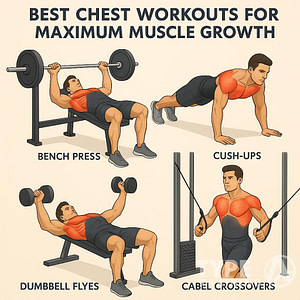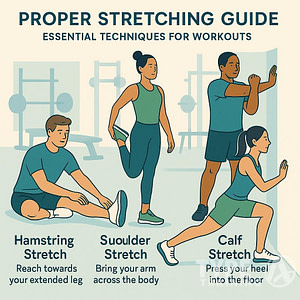Whether you should drink a protein shake before or after a workout is a common question among fitness enthusiasts. Research suggests that the timing of your protein shake is less critical than your total daily protein intake. What matters most is ensuring you consume enough protein throughout the day to support muscle repair and growth.
A smart approach involves consuming a protein shake either before your workout to fuel your exercise or after to aid in muscle recovery.
Including a mix of protein and carbohydrates can enhance your performance and recovery.
Popular posts:
For example, a pre-workout shake with 15-20 grams of protein and some carbohydrates can provide energy. Meanwhile, a post-workout shake with similar nutrients helps in recovery.
Tailoring your protein intake to your specific workout routine and goals ensures you get the most out of your nutrition plan.
Understanding the benefits of both pre- and post-workout nutrition can significantly improve your overall fitness results.
Key Takeaways
- Total daily protein intake matters most, not the timing.
- Consuming protein shakes either before or after workouts can be beneficial.
- Adjust protein intake to match your workout routine and goals.
Understanding Protein and Its Role in Fitness
Protein plays a crucial role in muscle development and recovery.
It involves processes like muscle protein synthesis and the provision of essential amino acids required for muscle repair and growth.
The Building Blocks of Muscle
Proteins are made up of amino acids, which are the fundamental building blocks of muscle.
When you consume protein, your body breaks it down into individual amino acids. These amino acids are then used to repair muscle fibers damaged during exercise and to build new muscle tissue.
Essential amino acids, which your body cannot produce on its own, must be obtained through your diet.
Having an adequate intake of these essential amino acids is vital for anyone aiming to increase muscle mass or improve muscle recovery.
For fitness enthusiasts, understanding the types of proteins consumed can make a significant difference in achieving fitness goals.
Protein Synthesis and Muscle Recovery
Muscle protein synthesis (MPS) is the process through which your body repairs and builds muscle tissue.
After a workout, particularly a strength-training session, your muscles need protein to kickstart this recovery process.
Studies indicate that total daily protein intake is more critical than specific timing.
Consuming protein within a few hours post-workout provides your muscles with the necessary nutrients to maximize MPS.
A balance of carbohydrates and protein, such as a 2:1 ratio (20-40 grams of carbs to 10-20 grams of protein), is often recommended after intense exercise.
This balance helps replenish glycogen stores and aids in the repair and growth of muscles.
Protein, therefore, is not just beneficial but essential for anyone serious about their fitness regime.
Ensuring optimal protein intake can significantly impact your ability to recover and grow stronger after each workout session.
Determining Protein Needs for Workout Efficiency
Understanding your protein needs can significantly enhance workout efficiency, supporting muscle repair and growth.
Factors like personal health, diet preferences, daily protein intake, and age must be considered.
Personalizing Protein Intake
A personalized protein intake plan ensures you meet your specific workout goals.
The International Society of Sports Nutrition (ISSN) suggests that athletes consume about 1.4-2.0 grams of protein per kilogram of body weight each day. This range helps to maintain muscle mass and support recovery.
Consulting with a registered dietitian or nutritionist can provide tailored advice. They consider your overall health, diet, and exercise regimen to create an effective protein plan.
Remember, total daily protein intake is crucial, and spreading protein consumption throughout the day may offer additional benefits.
Protein Intake and Age Considerations
Age influences how your body processes protein, impacting your workout efficiency.
Younger individuals may find it easier to build muscle with lower protein intake compared to older adults. This difference is due to muscle sensitivity to protein, which declines with age.
For older adults, increasing protein intake can help counteract muscle loss.
The recommended dietary allowance for older adults can be slightly higher.
It’s advisable to focus on high-quality protein sources such as lean meats, eggs, and legumes.
Regular consultations with healthcare providers, including registered dietitians, can help ensure that protein needs are met appropriately at different life stages.
Pre-Workout Nutrition for Optimal Performance
Consuming the right nutrients before a workout can significantly enhance your energy levels and sports performance.
Focus on balancing carbs, fats, and proteins to fuel your body effectively and optimize your fitness results.
Fueling Your Body With Carbs and Fats
Carbohydrates and fats serve as primary sources of energy for your body during pre-exercise.
Carbohydrates help to replenish glycogen stores in your muscles, which is essential for high-intensity and endurance workouts.
Consuming carbs 30 minutes to three hours before exercising provides the necessary fuel.
Fats, though not used as quickly as carbs, are another important macro nutrient.
They offer sustained energy, especially for longer duration workouts.
A small amount of healthy fat, such as from nuts or avocado, can support prolonged activities.
Balancing carbs and fats in your pre-workout meal can enhance your performance by stabilizing blood sugar levels and providing consistent energy.
The Impact of Pre-Workout Protein
Protein intake before exercising plays a crucial role in muscle growth and repair.
Consuming 10-20 grams of protein can help improve muscle protein synthesis.
This is important because it helps your muscles recover and grow after strenuous physical activities.
Whether you ingest protein from whole foods or a protein shake, it’s vital to get the timing right.
Eating protein 30 minutes to an hour before working out ensures your body has the amino acids available when needed.
This can reduce muscle damage and promote quicker recovery, enhancing your fitness outcomes.
Post-Workout Recovery and Muscle Building
Choosing the optimal time to consume a protein shake can significantly impact muscle recovery and growth. It’s essential to understand the key elements of post-workout nutrition to enhance muscle repair and recovery.
The Anabolic Window: Myth or Reality?
The concept of the “anabolic window” suggests that there is a limited time post-workout when your body is particularly primed for nutrient absorption. This window is often considered to be about 30 minutes to an hour after exercise.
Research indicates that muscle recovery and repair can benefit from protein intake anytime within a few hours post-exercise. This broader window challenges the strict timing often promoted.
Key Points:
- The “anabolic window” might not be as narrow as once thought.
- Timely protein intake is beneficial but not critically time-bound to a 30-minute window.
- Muscle repair can effectively occur with flexible protein timing within a few hours post-workout.
Post-Workout Protein: How Much and When?
After strength training, consuming enough protein to support muscle recovery and growth is crucial.
The amount you need can vary based on individual factors, such as body weight and workout intensity.
Most recommendations suggest consuming 20-40 grams of protein post-workout.
Quality sources like whey protein are often favored for their quick absorption and high amino acid content.
You can derive protein from various sources, including shakes or high-protein foods.
Choosing the Right Protein Source
Selecting the right protein source is crucial for your muscle-building and recovery goals.
Two primary categories dominate the market: animal-derived (like whey and casein) and plant-based protein options. Each has unique benefits and should be chosen based on your dietary preferences and specific needs.
Whey, Casein, and Plant-Based Proteins
Whey Protein: Derived from milk, whey protein is quickly absorbed by the body, making it ideal for post-workout recovery.
Whey protein isolate is a popular choice because it contains a higher protein content and fewer fats and carbs.
Casein Protein: Also from milk, casein is digested more slowly, providing a steady release of amino acids. This makes it suitable for sustained muscle repair, especially if consumed before bed.
Plant-Based Proteins: Alternatives like pea protein, hemp protein, and protein from beans offer options for vegetarians or those with lactose intolerance.
While they may digest slower than whey, they can be just as effective when combined properly. For instance, mixing pea and rice proteins creates a complete amino acid profile.
Whole Foods vs. Protein Supplements
Whole Foods: Sources such as Greek yogurt, nut butter, and milk not only provide protein but also essential vitamins, minerals, and other macronutrients. They are excellent to have in a balanced meal throughout the day.
Protein Supplements: Protein powders and shakes offer a convenient way to meet your daily protein needs, especially for those with busy schedules. These supplements can be tailored to specific dietary requirements, allowing precise control over protein intake without the added calories and fats often found in whole foods.
Balancing Macronutrients for Comprehensive Fitness Goals
Balancing macronutrients—protein, fats, and carbohydrates—is essential for achieving comprehensive fitness goals, such as building muscle or improving endurance.
Each macronutrient plays a unique role in supporting your body’s performance and recovery needs.
Protein’s Relationship with Fats and Carbohydrates
Protein is crucial for muscle repair and growth, especially after intense workouts. Consuming protein either before or after exercise aids in muscle recovery.
Pairing protein with carbohydrates helps replenish glycogen stores and provides energy, making it easier to maintain consistent performance during workouts. Including fats in your diet supports hormonal balance and aids overall nutrient absorption.
Carbohydrates are broken down into glucose, which fuels your muscles during physical activity.
Complex carbs like whole grains and vegetables offer sustained energy without causing rapid blood sugar spikes. Meanwhile, healthy fats from sources like avocados and nuts can be included in your diet for long-lasting energy and improved satiety.
Macro Ratios for Different Types of Training
Different training regimens require distinct macronutrient ratios.
Resistance training and strength-focused workouts often demand higher protein intake to support muscle repair and growth.
Aim for about 1.6 to 2.2 grams of protein per kilogram of body weight daily.
Athletes involved in endurance sports need higher carbohydrate intake. Aim for 6 to 10 grams per kilogram of body weight per day to sustain energy levels and enhance performance.
Balance your fat intake to ensure it doesn’t exceed 20-35% of your total daily calories. This supports both energy requirements and overall health.
Tailoring these macro ratios to your specific training and fitness goals enables you to optimize performance and recovery, making it crucial to adjust based on the activity and individual needs.
Implementing Protein Shakes in Your Diet
To maximize the benefits of protein shakes, it’s crucial to focus on the ingredients you include and the timing of your intake.
Crafting the Perfect Protein Shake
When making a protein shake, start with a high-quality protein powder. Options include whey, casein, or plant-based powders. Choose one that fits your dietary needs and preferences.
Incorporate macronutrients by adding a carbohydrate source. Fruits like bananas or berries work well and contribute vital vitamins and minerals.
Include healthy fats such as nut butter or avocado to round out your shake.
Blend your ingredients with a liquid base. Water, milk, or a plant-based alternative like almond milk can be used.
For extra health benefits, consider adding vegetables or superfoods like spinach or chia seeds. This can enhance both flavor and nutritional value.
Timing and Frequency for Optimal Results
Consuming a protein shake around your workout can promote muscle repair and growth. Research suggests it might not matter whether you drink your shake before or after exercising. The key is maintaining adequate protein intake throughout the day.
For strength training sessions, aim for a 2:1 ratio of carbs to protein. This means 20-40 grams of carbs and 10-20 grams of protein.
For endurance training, a different balance might be more effective. Adjust based on your activity type and personal goals.
Regular intake of protein shakes as snacks or meal replacements can help maintain steady macronutrient levels. Listening to your body and tailoring your intake to your lifestyle and goals is essential for optimum results.
Evaluating the Impact of Protein on Body Composition and Weight Management
Consuming adequate protein is crucial for those aiming to improve body composition. Protein aids in the development of lean muscle mass, which is essential for enhancing muscle definition.
For weight loss, protein can be beneficial as it promotes satiety. Feeling fuller for longer periods can help you manage your calorie intake more effectively.
High-protein diets may also boost your metabolism slightly, leading to more calories burned throughout the day. This is because protein requires more energy for digestion compared to fats and carbohydrates.
When you consume protein, your body undergoes muscle repair and recovery. This can lead to increases in muscle mass over time, provided you are also engaging in strength training exercises.
In terms of fat loss, maintaining or increasing muscle mass through protein intake helps you retain lean muscle while losing fat, resulting in a better body composition.
The timing of protein intake can also play a role. Studies suggest spreading your protein consumption evenly throughout the day, such as having 20-30 grams of protein per meal.
Here are a few protein sources to consider:
- Chicken breast
- Fish
- Greek yogurt
- Lentils
- Quinoa
Including these protein-rich foods in your diet can help you achieve your goals related to weight management and body composition. For additional information, see guidance from leading health authorities like ISSN on protein intake and its effects.
Frequently Asked Questions
Understanding when to drink a protein shake, whether before or after a workout, can influence muscle gain, weight loss, and overall exercise performance. This section addresses common questions about protein shake consumption timing and its implications for fitness goals.
Is it more beneficial to have a protein shake before or after workout for muscle gain?
Research indicates that the total daily protein intake is crucial for muscle repair and growth. It doesn’t matter whether you drink a protein shake before or after your workout. The key is to ensure you consume enough protein throughout the day.
Should protein intake be before or after a workout when trying to lose weight?
Your specific goals and preferences determine the best timing for protein intake when trying to lose weight. Some people find having a shake before a workout helps with satiety, while others prefer it afterwards to aid recovery. Understanding your body’s response is essential.
Can drinking a protein shake after working out help with weight loss?
Drinking a protein shake after working out can help with weight loss by promoting muscle repair and reducing hunger. Consuming protein post-workout aids in muscle recovery and may support weight management efforts by keeping you full, reducing the likelihood of overeating later.
What are the benefits of having a protein shake before a workout?
Having a protein shake before a workout can provide energy and amino acids necessary for muscle performance. It prepares your body for the workout, potentially enhancing endurance and reducing muscle breakdown during intense exercise sessions. Including carbohydrates in your shake can also boost energy levels.
How does protein consumption timing affect fat loss and muscle building?
Consistent protein intake throughout the day is more influential than timing. Both fat loss and muscle building benefit from adequate protein. Ensuring a balanced protein intake helps maintain muscle mass while losing fat, regardless of whether the protein is consumed before or after workouts.
When is the optimal time to drink a protein shake on non-training days?
On non-training days, there isn’t a specific optimal time to drink a protein shake. The focus should be on meeting your daily protein needs.
You could have it as a snack between meals. Alternatively, you could have it as part of breakfast or lunch to ensure you’re getting enough protein.















